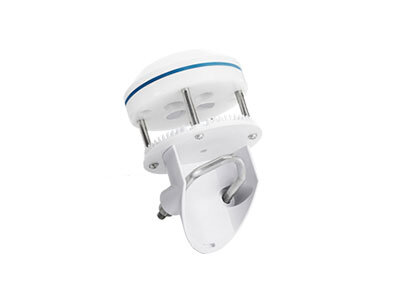Product Documents
Description
Accurate. Dependable. Affordable. You can have everything.
Features
-
Wind speed and direction
-
Easy installation
-
No moving parts
-
All data transmitted over a single wire
-
Digital SDI-12 communication
Measuring into stiff headwinds
When it comes to measuring wind, trade-offs have always been involved. Cup anemometers can’t measure both wind speed and wind direction (or low wind speeds, for that matter). They’re also prone to malfunction since they all contain moving parts. Meanwhile, sonic anemometers have always been too costly. Until now.
The best of both worlds
The wind-tunnel-tested ATMOS 22 ultrasonic anemometer delivers the best of both worlds. It’s accurate at low wind speeds because there aren’t any moving parts that cause friction or fail. And it’s inexpensive, especially when you consider the low-energy design. Accuracy. Dependability. Affordability. You get all three with the ATMOS 22.
Accuracy that will blow you away
If you want accurate wind profiling, a sonic anemometer is the obvious choice. Designed with canopies in mind, the ATMOS 22 registers even the lowest thresholds of wind speed (0 m/s) with the added ability to detect fine-scale variations within 0.01 m/s resolution.
Contrast the ATMOS 22’s advanced technology to a cup or propeller wind anemometer. Neither will spin if wind speed is too low. Cup anemometers also don’t indicate wind direction, unless you combine them with a wind vane. And both are prone to additional inaccuracies due to worn out moving parts. But with the ATMOS 22, you can accurately measure wind speed anywhere, every time, with total confidence.
Wind measurement is now a breeze
The ATMOS 22 was designed without moving parts, meaning there’s never any mechanical wear. No oiling or replacing bearings. And no recalibration required. Just reliability you can continue to count on.
Not only does its ultra-low power consumption make it ideal for long-term, remote installations, but its compact size makes it small enough to deploy inside canopies. And instead of having to make field visits to collect data and check sensor and system functions, you can monitor information in real time and download data using any internet-connected device by connecting the ATMOS 22 to a ZL6 data logger. Which not only saves you time, but provides worry-free operation and peace of mind.
A low-cost sonic anemometer. Yes, you heard right.
The ATMOS 22 is not only far more affordable than other sonic anemometers but also uses 100 to 1,000 times less power. Running on less than 100 uA, the ATMOS 22 frees you to make wind measurements in multiple locations without having to constantly change batteries.
Sounds like a smarter way to measure wind. Because it is.
The precise accuracy, yet low-maintenance of sonic measurement. The low-cost of a regular anemometer, plus even lower power consumption. The ATMOS 22 was engineered to offer a wide range of advantages across the widest range of wind speed, all for an affordable price.
Features
| Description | Range | Resolution | Accuracy |
|---|---|---|---|
| Horizontal Wind speed | 0 to 30 m/s | 0.01 m/s | the greater of 0.3 m/s or 3% of measurement |
| Wind gust | 0 to 30 m/s | 0.01 m/s | the greater of 0.3 m/s or 3% of measurement |
| Wind direction | 0 to -359° | 1° | ± 5° |
| Tilt | 0 to 180° | 0.1° | ± 1° |
| Dimensions | 10 cm diameter × 16 cm height |
|---|---|
| Supply voltage (VCC) to GND | Minimum 3.6 VDC Maximum 15.0 VDC |
| Digital input voltage (logic high) | Minimum 2.8 V Typical 3.0 V Maximum 3.9 V |
| Digital input voltage (logic low) | Minimum –0.3 V Typical 0.0 V Maximum 0.8 V |
| Power line slew rate | Minimum 1.0 V/ms |
| Current drain (during measurement) | Minimum 0.050 mA Typical 0.125 mA Maximum 0.500 mA |
| Current drain (while asleep) | Minimum 0.050 mA Typical 0.125 mA Maximum 0.150 mA |
| Operating temperature range | Minimum –40 °C Maximum 50 °C |
| Power up time (SDI Ready)—aRx! commands | Typical 10 s |
| Power up time (SDI Ready)—other commands | Typical 800 ms |
| Measurement duration | Typical 110 ms Maximum 3,000 ms |
| Compliance | Manufactured under ISO 9001:2015 EM ISO/IEC 17050:2010 (CE Mark) |
Additional information
| Additional Info | Features <ul data-rte-list |
|---|

